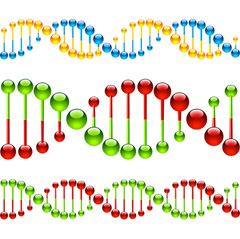The New Authoritarian Approach to Science Education
I participated in a series of short interviews on Sunday 25th September 2011 on a number of BBC Local Radio stations with James Williams, a lecturer in Science Education at the University of Sussex. The theme of the interviews was the recent statement from some 30 scientists, including Richard Dawkins and Sir David Attenborough, demanding that, among other things, intelligent design (ID) be banned from discussion in schools as a scientific proposition[1].
Williams has subsequently blogged about the encounter at WordPress.com.[2] Both in the interviews and in his blog, Williams is significantly confused about ID. The current misrepresentation of intelligent design as ‘creationism’ and ‘not science’ militates against objective scientific enquiry and good science education. In fact, it introduces an unwelcome element of propaganda.
Intellectual Fascism?
First, though, I'd like to make a personal comment. James Williams and I have debated about ID previously and, although we do not agree, I recognise him as a polite and courteous individual. He is wrong, though, when he says I descended to name-calling. I did not call him an 'intellectual fascist'. I said that the document to which he had put his name 'smacks of intellectual fascism'. That's quite different.
But if, as he says, name-calling is evidence of losing an argument, I suggest he track its level from ID opponents on both sides of the Atlantic over the last decade. He might like to start with PZ Meyers’ recent visit to Glasgow. If name-calling is the measure of failure, they lost the argument long ago. In fact, one of the curious difficulties with this debate is the reluctance of the anti-ID lobby to engage seriously with the evidence for design.
While we’re on the subject of intellectual fascism, I suggest Williams revisits the 2008 case of Prof Michael Reiss.[3] You’ll recall he was forced out of his post as Director of Education at the Royal Society for suggesting that Intelligent Design should be discussed in science classes if pupils raised it. The shocking irony here is that Reiss does not accept ID – quite the opposite – but felt it should be discussed if it arose. He lost his position. I think even Richard Dawkins said it made him feel squeamish. If it didn’t, it should have. This is the Royal Society whose motto ‘Nullius in Verba’ means, roughly translated, ‘take the word of no-one’ or more simply ‘go where the evidence leads’.
I understand ‘fascism’ to have elements of authoritarianism which tolerates no opposing position, and I think I recognise intellectual fascism when I see it. The best antidote is the scientific method which, when properly applied, rejects arrogant assertion and builds dispassionately from the evidence.
Incidentally, what James Williams actually said about discussing ID in schools is not that different from Michael Reiss. He should be careful; the establishment might be on to him next.
Defining Intelligent Design
Williams’ contention that I don’t know the definition of Intelligent Design used by the Discovery Institute is just fatuous. The primary definition of ID, widely used by Discovery, is that ‘certain features of the universe and of living things are best explained by an intelligent cause, not by an undirected process such as natural selection’.
What that means is that there is hard evidence in nature which suggests design. The starting point is the evidence. No-one is imposing design on nature and then looking for evidence. It’s the other way round. What James Williams seems to find difficult is the difference between a scientific conclusion and its implications. Of course ID has profound religious and philosophical implications, but those are consequent to the interpretation of the evidence.
Perhaps I can help Williams with a well-known quotation from one of his co-signatories. Richard Dawkins has said that ‘Darwin made it possible to be an intellectually fulfilled atheist’. I presume Dawkins’ point is that evidence of evolution in nature leads to the implication that there is no God. Now no-one would accuse Prof Dawkins of wanting atheism in the science curriculum – or would they? Perhaps some people find that ID makes them intellectually fulfilled theists. That wouldn’t be surprising, but it is a completely separate matter from the nature of the evidence on which ID rests.
It is also important that the distinction between ID and ‘creationism’ is clear. The latter, as popularly understood, is a religious position which uses Biblical texts as a framework for doing science. In fairness, though, orthodox Christian belief holds that the universe has a Creator. So, in that sense, all Christians are, almost by definition, ‘creationist’, in a general rather than in a particular sense. All that is very different from ID which starts with the scientific evidence and makes inferences from it.
Few things in this debate are more important than defining your terms clearly. Using terms like ‘creationism’ loosely just confuses the issue and leads to easy stereotyping. ‘Evolution’ also has several different meanings such as adaptation, common descent, or mutation and natural selection as the generators of biological information and new life forms. If, in science, you are going to promote some ideas and ban others, you should really know precisely what you are talking about. The easy conflation of ID and creationism is not only inaccurate but unworthy of credentialed scientists.
The Information Question
 A significant part of the interviews was about the scientific evidence for ID and in particular the sophisticated information carried in DNA which builds living things. Williams did not seem able to grasp that the question about the origin of that information arises from our scientific knowledge of DNA and is therefore a proper matter for scientific enquiry. That point alone legitimises ID as science. The banning order that Williams and his colleagues want enforced would seriously limit the ability of teachers and students to explore these matters in a science class. Such an approach is entirely contrary to the scientific method and to good science education where no relevant question and possible explanation should be beyond debate.
A significant part of the interviews was about the scientific evidence for ID and in particular the sophisticated information carried in DNA which builds living things. Williams did not seem able to grasp that the question about the origin of that information arises from our scientific knowledge of DNA and is therefore a proper matter for scientific enquiry. That point alone legitimises ID as science. The banning order that Williams and his colleagues want enforced would seriously limit the ability of teachers and students to explore these matters in a science class. Such an approach is entirely contrary to the scientific method and to good science education where no relevant question and possible explanation should be beyond debate.
James Williams insists that I wouldn’t tell him what I meant by information in DNA. Well let me try. That DNA carries functional information is universally understood and we talk about the ‘genetic code’. Bill Gates says the information in DNA is more sophisticated than Microsoft’s software – so he seems to recognise what it is. ID does not have its own definition of information, but uses the normal understanding of the phenomenon.
Information is a non-material entity which usually involves data embedded in a physical substrate, like print on a page or software on a hard disk. The information carried by DNA is not simply syntactic or Shannon information, like a jumble of random letters on a page. It is also semantic or message-carrying, like a piece of English prose, and holds the specific information which builds living things. I suggest Williams reads ‘God’s Undertaker – Has Science buried God’ (Lion 2009) by Prof John Lennox, a mathematician at Oxford, who certainly knows what he is talking about when he deals with types of information.
Prof Shallit's comments on information, to which Williams refers, are of no real help here. Shallit appears to dodge the issue of the type of information that is important for biology, specifically, functional information. The information Shallit writes about does not distinguish between complete gibberish or meaningful messages. For biological life, it matters a great deal whether the information is functional or not, and Shallit simply fails to deal with this. Stephen Meyer in his book ‘Signature in the Cell’ (HarperOne 2009) certainly does[4] [5].
The information carried in the base-pair arrangements of DNA is highly complex and specific. The arrangement of the base pairs is neither random, nor regular. It is specifically ordered to code for the individual amino acids which produce particular proteins. By ‘specific’, therefore, we mean that the information in DNA interacts with its environment to achieve particular ends – for example, the production of some proteins which fold themselves into highly specialised configurations to enable necessary chemical reactions within the cell.
It is entirely scientific to infer that such information could arise from an intelligent source since that matches all our experience of functional information. No other current explanation matches that in credibility. At the very least, the ID position is worthy of debate; at most, it is compelling evidence of design.
What is the origin of biological information?
To summarise, life is as it is because it is programmed. ID asks the question, where does that information come from? That is a perfectly legitimate, scientific question because it arises from an observable phenomenon – the genetic code in DNA. It is a question relating to what is actually there – biological information – and is not an idea imported from another discipline. The tentative answer it offers is that, by the method of inference to the best explanation and in line with our experience elsewhere, it points to an intelligent mind. No more, no less. This is absolutely consistent with all that we know, and does not deal with what we don’t know. As I insisted during the interviews, not to be allowed to explore this kind of reasoning in science classes is preposterous.
ID does not go further than to infer that there is evidence of design. To go beyond that takes us into philosophy or theology and that’s for others to explore. Indeed, it is common ground on both sides of this discussion that nature gives the appearance of design. In one of his best known works, Richard Dawkins says, ‘Biology is the study of complicated things that give the appearance of having been designed for a purpose’ (‘The Blind Watchmaker’, 1996, p1). The real difference is between those who say that the design is imaginary and those who infer that the design is real.
Perhaps the most vacuous argument deployed by James Williams is that any intelligent mind we perceive in nature must be a human mind because we only have human minds. Well, for a start some scientists, including Richard Dawkins and Francis Crick, have understood the problem of the origin of life and have speculated about forms of panspermia – the proposition that life was seeded here from another planet. So, presumably, some form of alien intelligence can’t be ruled out. Einstein’s comment about ‘a spirit vastly superior to that of man’ in the context of ‘the pursuit of science’ is also relevant. I think a word with his philosophy department would help James Williams to get a grip on First Causes which imply a form of intelligence which is certainly not human. That science cannot contemplate the possibility of some intelligence beyond our own seems an absurdly limiting proposition. For example, would it not lead to the shutting down of SETI – the search for extra-terrestrial intelligence - which, according to Williams, could only be human intelligence?
I repeat, however, that ID does not set out to be a detailed argument for God. It is an inference that there is clear evidence in nature of intelligent causation. It’s not that hard to grasp. ID leaves others to work out the implications.
Monolithic Darwinism Inhibits Scientific Investigation
What James Williams may not fully appreciate is that his co-signatories are promoting a view of science which only allows certain kinds of explanations. In effect, by their rules, only entirely physical or material causes can be considered. In the area of origins, non-material causes have to be considered and are clearly possible. Interestingly, James Williams conceded that in one interview when he acknowledged that he thought there is 'some force' behind the universe. That’s almost Intelligent Design!
I must say that I was struck by William's apparent lack of understanding of the difference between historical and experimental science. In historical science, where you are seeking explanations for unrepeatable events, you have to use the method of 'inference to the best explanation'. Darwin certainly understood that, as much of evolutionary theory falls into that category.
If you define science as methodological naturalism and exclude the possibility of a non-material cause of the natural and living worlds, you finish up in the absurd position of Judge Jones of Dover Trial USA fame who ruled that, while ID may well be true, it is not science! That means that if ID is correct in the area of origins, then contemporary science is wrong. But by then you've stopped doing objective science and are simply promoting the philosophy of ideological naturalism. And, just for the record, do we really believe that courts are best suited to adjudicate on the boundaries of science? In Britain, we have some spectacular examples of courts getting it wrong. Judge Jones is certainly not infallible[6].
The bottom line is that if science restricts its explanations to purely material causes, then if design in nature is real, science will never reveal it. In other words if you define science to exclude non-material causes, it will be no surprise that science finds there are none. You can’t credibly exclude a conclusion if you don’t allow it to be considered in the first place. Something a bit circular about all that!
Philip Johnson and ID
Now, with reference to some other issues James Williams raised, let me try to clarify. First, his reference to the late Philip Johnson is quite erroneous. Philip Johnson first came to ID through reading books like Michael Denton’s ‘Evolution – a Theory in Crisis’ in the 1980s alongside Richard Dawkins ‘The Blind Watchmaker’. He subsequently published his own misgivings about Darwinism in ‘Darwin on Trial’ in 1991, and has been associated with the position that we should go where the scientific evidence about design leads. Other ID pioneers were influenced by the work of Thaxton, Bradley and Olsen in ‘The Mystery of Life’s Origin’ (Philosophical Library, New York, 1984).
Over the years, Philip Johnson, a distinguished law professor, has also written about the wider implications of ID. Whatever he may or may not have said about science education in schools, it was most certainly not the reason for him getting into ID. In fact, his primary contention is that ‘the important issue is not the relationship of science and creationism, but the relationship of science and materialist philosophy’ (from a summary of his concerns about Darwinism to academics, 1989). Johnson was concerned with very much more than the curriculum of schools.
Intelligent Design and Schools
On Williams’ confusion about my position about teaching ID in schools, I’m more than happy to elucidate. The Centre for Intelligent Design in the UK is not targeting schools or arguing that ID should be taught formally within the curriculum. It is, however, strongly of the view that to disallow discussion of ID in science classes is a blatant corruption of the nature of science education and the opposite of encouraging objective scientific enquiry. At a time when some scientists working at CERN have suggested that Einstein may be wrong about the speed of light, we should at least entertain the possibility that Darwin might be wrong, or that neo-Darwinism is not the whole story, and that the design paradigm may have substantial merit.
Interestingly the atheist philosopher of science Prof Bradley Monton has recently argued in ‘Seeking God in Science’ (Broadview Press, 2009) that ID should be seriously considered as science, even though he is not personally persuaded by it. I’m attracted to ID because I judge the scientific evidence for it to be highly credible and because I find neo-Darwinism seriously deficient in certain critical areas. But like other ID proponents, I am happy to go with any scientific position which is clearly supported by evidence.
It is disturbing that the scientists who have signed the statement which has occasioned this discussion so misunderstand Intelligent Design and fail to distinguish it from ‘creationism’. It is hard to escape the conclusion that this is a deliberate ploy to avoid confronting the increasingly persuasive evidence for design in nature. Even more worrying is the illiberal, unscientific, and, yes, intellectually-fascist nature of their demands.
I’m sorry I don’t have the expertise to debate the crop circles and astrology that James Williams is so keen on. I’m not aware that they are knocking on the doors of schools or that their arguments have the scientific rigour of intelligent design. Anyway, the same principles would apply. Is their data scientifically valid or not? That needs to be the test.
Dr Alastair Noble
Director
The Centre for Intelligent Design UK
October 2011, updated 2017
[1] “There should be enforceable statutory guidance that they may not be presented as scientific theories in any publicly-funded school of whatever type.” http://evolutionnotcreationism.org.uk/
[2] http://jamesdwilliams.wordpress.com/2011/09/25/intelligent-design-creationism-is-not-science/
[3] http://www.timesonline.co.uk/tol/news/science/article4768820.ece
[4] For a more academic treatment of the subject, see Dembski and Marks, ‘Why Darwinian Evolution cannot create Biological Information’, in ‘The Nature of Nature’ (ISI Books 2011) p 360.
[5] A detailed response to Shallit’s criticism of Meyer’s work can be found in ‘Signature of Controversy’, Ed. D Klinghoffer, Discovery Institute Press, 2010, chaps 19,20
[6] See Stephen Meyer, ‘Sauce for the Goose’ in ‘The Nature of Nature’ (ISI Books 2011) p95
Image credits:
Thumbnail - courtesy of Flickr.com, Creative Commons 2
All article images from Dreamstime